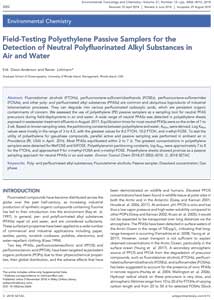
Dixon-Anderson, Erik and Rainer Lohmann. Field-testing polyethylene passive samplers for the detection of neutral polyfluorinated alkyl substances in air and water. Environmental Toxicology and Chemistry 37, issue 12 (2018): 3002-3010.
Fluorotelomer alcohols (FTOHs), perfluorooctane‐sulfonamidoethanols (FOSEs), perfluorooctane‐sulfonamides (FOSAs), and other poly‐ and perfluorinated alkyl substances (PFAS) are common and ubiquitous byproducts of industrial telomerization processes. They can degrade into various perfluorinated carboxylic acids, which are persistent organic contaminants of concern. We assessed the use of polyethylene (PE) passive samplers as a sampling tool for neutral PFAS precursors during field‐deployments in air and water. A wide range of neutral PFAS was detected in polyethylene sheets exposed in wastewater treatment effluents in August 2017. Equilibration times for most neutral PFAS were on the order of 1 to 2 wk. Based on known sampling rates, the partitioning constants between polyethylene and water, KPEw, were derived. Log KPEw values were mostly in the range of 3 to 4.5, with the greatest values for 8:2 FTOH, 10:2 FTOH, and n‐ethyl‐FOSE. To test the utility of polyethylene for gas‐phase compounds, parallel active and passive sampling was performed in ambient air in Providence (RI, USA) in April 2016. Most PFAS equilibrated within 2 to 7 d. The greatest concentrations in polyethylene samplers were detected for MeFOSE and EtFOSE. Polyethylene/air partitioning constants, log KPEa, were approximately 7 to 8 for the FTOHs, and approached 9 for n‐methyl‐FOSA and n‐methyl‐FOSE. Polyethylene sheets showed promise as a passive sampling approach for neutral PFAS in air and water.

